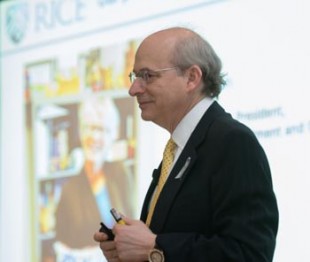Leebron highlights innovation at spring town hall
Rice President David Leebron reminded an audience of more than 400 at the May 7 town hall meeting that Rice must constantly strive to innovate, adhere to its core principles and invest wisely if it is to remain one of the best values in higher education.
“This is a very competitive environment,” Leebron said to a packed audience at Rice Memorial Center’s Grand Hall. “We need to constantly ask ourselves, ‘How can we better achieve research excellence?’ ‘How can we better achieve teaching excellence?'”
In a 40-minute presentation, Leebron reiterated Rice’s mission, strengths, values and core commitments, and he described some of the recent and upcoming changes that Rice is undertaking to address its priorities for the new century.
He said Rice must continue to be accessible and affordable, provide a distinct undergraduate experience, excel in research and graduate education and make an impact on the world.
“That impact comes, in part, from the research that we do, and in part from the education we give,” Leebron said. “Education is changing, and it’s changing in particular with respect to the idea that we need to be educating our students for impact.”
He said one of the most dramatic shifts is in student perception of the value of educational experiences outside the classroom. Thirty years ago, students believed that three-fourths of the value of their education was from classroom instruction and related activities, but today’s students say more than half the value of undergraduate education comes from other activities.
“This is not in the future,” Leebron said. “What they expect now is all these other things, like mentoring, leadership opportunities, internships, research experience and international experience. Those are all the things they expect now that will make up a majority of the value they see in their experience.” Leebron emphasized that students still regard the quality of their classroom experience as extremely important, but they expect the additional opportunities as well.

David Leebron reiterated Rice's mission, strengths, values and core commitments at the spring town hall meeting. Photo by Jeff Fitlow
Leebron said Rice is well positioned financially to meet the challenges of the changing landscape in higher education. He said the university’s AAA credit rating was recently reaffirmed. In addition, the university’s endowment has recovered and grown since the 2008 financial crisis.
While the recovery will support some increased endowment spending, Leebron said, Rice must be diligent in controlling expenses and making wise investments and allocating resources to where they are needed most.
He said Rice will continue to invest in eight strategic initiatives that are priorities as Rice enters its second century: data science, enhancing research, quality teaching and digital learning, biosciences and Texas Medical Center relations, energy and environment, the arts, international engagement and cultural understanding, and becoming more entrepreneurial. The university will also seek to support the strategic priorities of each school.
Rice also will make key facility investments that will likely include upgrades to undergraduate teaching labs, a clean room facility, the Oshman Engineering Design Kitchen, parking, office space and utility tunnels. He said the university has also undertaken a major study of student spaces to better understand what is needed to support the greater vibrancy of student organizations and activities on campus.
He said substantial construction will take place in the coming year on the Moody Center for the Arts, the Patterson Sports Performance Center, the Holloway Field Stadium and the renovation of Jones College.
Each spring town hall includes staff recognition. Leebron presented the Elizabeth Gillis Award for Exemplary Service to Jana Callan, assistant vice president for human resources. (Read more about that here.)He also recognized 272 employees for service milestones of five years or more. Of these, 40 were recognized for service of 25 years or more, an indicator, Leebron said, that Rice is a place where employees want to spend their careers.
He said recent data shows that Rice’s faculty-to-staff and student-to-staff ratios are competitive with its peer institutions. At the same time, he said, “We have to learn how to be more efficient and make sure we’re dynamic enough to be shifting in response to the needs of our faculty and students.”
Leebron said Rice’s high rankings in U.S. News, Princeton Review and the Chronicle of Higher Education, among others, show that Rice remains a leader in higher education both nationally and internationally.
He also cited a new ranking from the Brookings Institute that provides a clear indication of the economic value of a Rice education. Rice ranked 12th overall in the country and fourth among nationally prominent research universities.
“(Brookings) asked the question, ‘How much does the education at this particular institution add to your earnings, compared to what you might have expected from going to a similar institution?'” he said.”This is yet another ranking, and there are actually now several like this, that say unequivocally, a Rice education has not just a value in terms of the people you will meet and your growth as a person, but it actually has clear economic value. As a return on investment, I wish my financial investments did as well as the educational investments that our students and their families make.”
The Town Hall Committee of B.J. Smith, Carlos Solis and Chair Marie Wehrung welcomes feedback on the event at http://staff.rice.edu/post_event_TownHall_survey.asp. You may also view the full town hall slide presentation here.


Leave a Reply